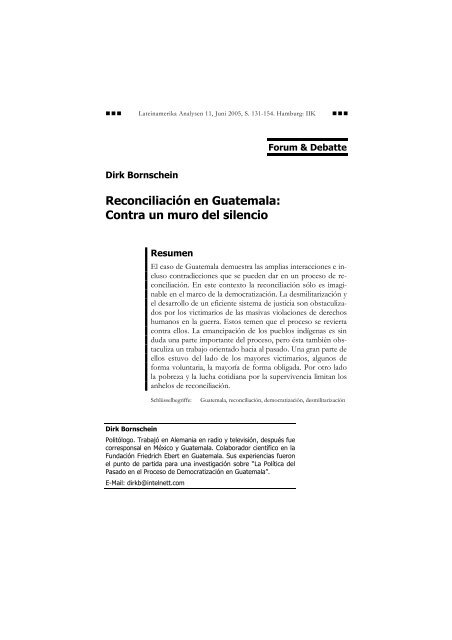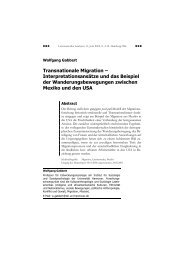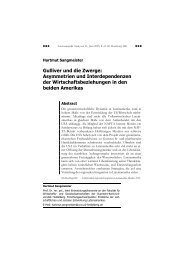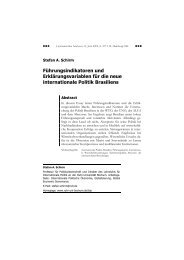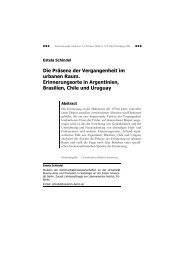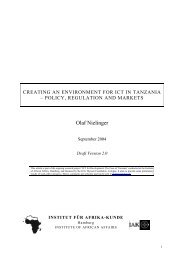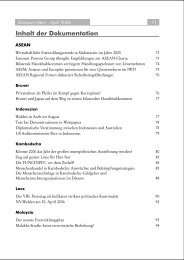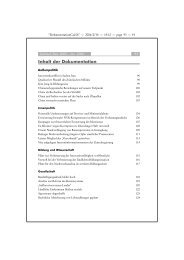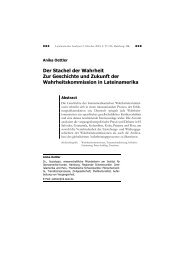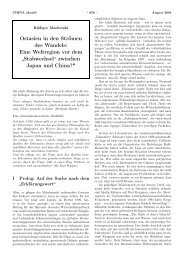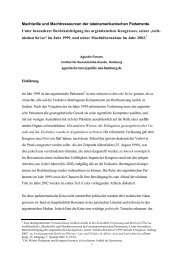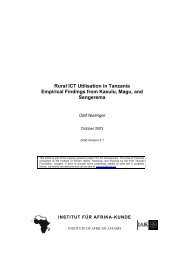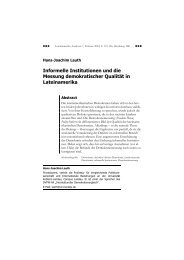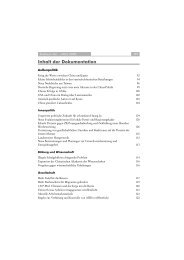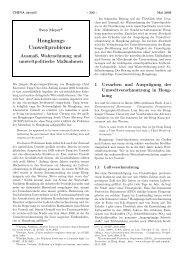Reconciliación en Guatemala: Contra un muro del silencio
Reconciliación en Guatemala: Contra un muro del silencio
Reconciliación en Guatemala: Contra un muro del silencio
You also want an ePaper? Increase the reach of your titles
YUMPU automatically turns print PDFs into web optimized ePapers that Google loves.
��� Lateinamerika Analys<strong>en</strong> 11, J<strong>un</strong>i 2005, S. 131-154. Hamburg: IIK ���<br />
Dirk Bornschein<br />
<strong>Reconciliación</strong> <strong>en</strong> <strong>Guatemala</strong>:<br />
<strong>Contra</strong> <strong>un</strong> <strong>muro</strong> <strong>del</strong> sil<strong>en</strong>cio<br />
Forum & Debatte<br />
Resum<strong>en</strong><br />
El caso de <strong>Guatemala</strong> demuestra las amplias interacciones e incluso<br />
contradicciones que se pued<strong>en</strong> dar <strong>en</strong> <strong>un</strong> proceso de reconciliación.<br />
En este contexto la reconciliación sólo es imaginable<br />
<strong>en</strong> el marco de la democratización. La desmilitarización y<br />
el desarrollo de <strong>un</strong> efici<strong>en</strong>te sistema de justicia son obstaculizados<br />
por los victimarios de las masivas violaciones de derechos<br />
humanos <strong>en</strong> la guerra. Estos tem<strong>en</strong> que el proceso se revierta<br />
contra ellos. La emancipación de los pueblos indíg<strong>en</strong>as es sin<br />
duda <strong>un</strong>a parte importante <strong>del</strong> proceso, pero ésta también obstaculiza<br />
<strong>un</strong> trabajo ori<strong>en</strong>tado hacia al pasado. Una gran parte de<br />
ellos estuvo <strong>del</strong> lado de los mayores victimarios, alg<strong>un</strong>os de<br />
forma vol<strong>un</strong>taria, la mayoría de forma obligada. Por otro lado<br />
la pobreza y la lucha cotidiana por la superviv<strong>en</strong>cia limitan los<br />
anhelos de reconciliación.<br />
Schlüsselbegriffe: <strong>Guatemala</strong>, reconciliación, democratización, desmilitarización<br />
Dirk Bornschein<br />
Politólogo. Trabajó <strong>en</strong> Alemania <strong>en</strong> radio y televisión, después fue<br />
corresponsal <strong>en</strong> México y <strong>Guatemala</strong>. Colaborador ci<strong>en</strong>tífico <strong>en</strong> la<br />
F<strong>un</strong>dación Friedrich Ebert <strong>en</strong> <strong>Guatemala</strong>. Sus experi<strong>en</strong>cias fueron<br />
el p<strong>un</strong>to de partida para <strong>un</strong>a investigación sobre “La Política <strong>del</strong><br />
Pasado <strong>en</strong> el Proceso de Democratización <strong>en</strong> <strong>Guatemala</strong>”.<br />
E-Mail: dirkb@intelnett.com
��� 132 Dirk Bornschein ���<br />
Abstract<br />
Dirk Bornschein<br />
Wiederaussöhn<strong>un</strong>g in <strong>Guatemala</strong>: Geg<strong>en</strong> eine Mauer des<br />
Schweig<strong>en</strong>s<br />
Der Fall <strong>Guatemala</strong> zeigt, welche weit reich<strong>en</strong>d<strong>en</strong> Interaktion<strong>en</strong> <strong>un</strong>d sogar<br />
Widersprüche im Prozess der Wiederaussöhn<strong>un</strong>g auftauch<strong>en</strong> könn<strong>en</strong>.<br />
Ohne ein<strong>en</strong> gleichzeitig<strong>en</strong> Blick auf die Demokratisier<strong>un</strong>g ist der Prozess<br />
hier kaum vorstellbar. Demilitarisier<strong>un</strong>g <strong>un</strong>d der Aufbau eines effizi<strong>en</strong>t<strong>en</strong><br />
Justizsystems werd<strong>en</strong> von der Angst der Täter der massiv<strong>en</strong> M<strong>en</strong>sch<strong>en</strong>rechtsverletz<strong>un</strong>g<strong>en</strong><br />
im Krieg begleitet, dass sich dies geg<strong>en</strong> sie w<strong>en</strong>d<strong>en</strong><br />
könnte. Die Emanzipation der indig<strong>en</strong><strong>en</strong> Völker ist zweifelsohne ein wichtiger<br />
Bestandteil der Aussöhn<strong>un</strong>g, behindert zurzeit aber d<strong>en</strong>noch die vergang<strong>en</strong>heitsori<strong>en</strong>tierte<br />
Vision der Arbeit. In <strong>Guatemala</strong> war ein Großteil<br />
dieser M<strong>en</strong>sch<strong>en</strong> gezw<strong>un</strong>g<strong>en</strong>ermaß<strong>en</strong> oder freiwillig auf der Täterseite.<br />
Auch die Armut überlagert oftmals das Verlang<strong>en</strong> der M<strong>en</strong>sch<strong>en</strong> nach<br />
Aussöhn<strong>un</strong>g.<br />
Summary<br />
Dirk Bornschein<br />
Reconciliation in <strong>Guatemala</strong>: Battling Against a Wall of<br />
Sil<strong>en</strong>ce<br />
The case of <strong>Guatemala</strong> shows the broad interactions and contradictions<br />
that can happ<strong>en</strong> in a reconciliation process. In this context, reconciliation<br />
is just imaginable within the frame of democratisation. The demilitarising<br />
and developm<strong>en</strong>t of an effici<strong>en</strong>t juridical system are hindered by perpetrators<br />
of massive human rights violations during the war; they fear that the<br />
process will turn against them. The emancipation of indig<strong>en</strong>ous people is<br />
<strong>un</strong>doubtedly an important part of the process but it also hinders work ori<strong>en</strong>ted<br />
to the past. A large number of these people were sympathetic towards<br />
the biggest perpetrators – some vol<strong>un</strong>tarily but most of them forcefully.<br />
On the other hand, poverty and daily struggle for survival limit the<br />
hopes for reconciliation.


